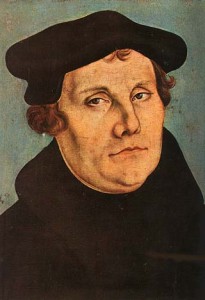By Cris D. Putnam
 During the fourteenth century, the Waldenses, a truly evangelical group known for their remarkable holiness and simple lifestyle, published a treatise designed to prove that the papal system was Antichrist. This was a remarkable change in position from their earlier position in The Noble Lesson that taught that the Antichrist was an individual. Boldly defying the papists, they insisted on using translations of Scripture that the common man could understand. In obedience to the word of God, they rejected masses, purgatory, and prayers for the dead.[i] The Waldenses were severely persecuted for centuries. In 1545, some three to four thousand of them were massacred at what is now known as Massacre of Mérindol by Roman Catholic President of the parliament of Provence, France and the military commander Antoine Escalin des Aimars.[ii] As early as 1631, scholars began to regard the Waldenses as early forerunners of the Protestant Reformation.
During the fourteenth century, the Waldenses, a truly evangelical group known for their remarkable holiness and simple lifestyle, published a treatise designed to prove that the papal system was Antichrist. This was a remarkable change in position from their earlier position in The Noble Lesson that taught that the Antichrist was an individual. Boldly defying the papists, they insisted on using translations of Scripture that the common man could understand. In obedience to the word of God, they rejected masses, purgatory, and prayers for the dead.[i] The Waldenses were severely persecuted for centuries. In 1545, some three to four thousand of them were massacred at what is now known as Massacre of Mérindol by Roman Catholic President of the parliament of Provence, France and the military commander Antoine Escalin des Aimars.[ii] As early as 1631, scholars began to regard the Waldenses as early forerunners of the Protestant Reformation.
Following the Waldenses it was not long before other Christians were viciously persecuted by Rome: The Hussites, the Wycliffites, and the Lollards also proclaimed that the pope was the Antichrist, the Man of Sin, and that the papacy was the Beast system. These were persecuted Bible-believing Christians who simply wanted to worship and read their Bibles free from Roman popery. These early expressions of the papal antichrist could seemingly be easily dismissed for the all-too-common tactic of demonizing one’s enemy. But as the reformation progressed, and the evidence mounted, it quickly became the dominant position. Contrary to the early rebels and polemicists, Martin Luther did not intend to break away from the Roman Catholic Church, but rather reform it. He did not start out with a bad opinion of the pope. He sincerely believed that the pope, being a man of God, would respond favorably when he nailed up his Ninety-five Theses on October 31, 1517. Yet, just a few years later, after burning the papal bull from the Diet of Worms, Luther had also come to the firm conclusion that the papacy was incorrigibly the Antichrist. He promoted the idea in many of his later writings, most forcefully in the Smalcald Articles:
This business shows overwhelmingly that he is the true end-times Antichrist, who has raised himself over and set himself against Christ, because the Pope will not let Christians be saved without his authority (which amounts to nothing, since it is not ordered or commanded by God). This is precisely what St. Paul calls “setting oneself over God and against God.” [iii]
Here Luther argues unambiguously that the pope shows himself to be the “true end-times Antichrist.” This polemic is concerning the papal bull, Unam Sanctam,which was issued to counter Philip the Fair’s effort to separate the civil and spiritual domains. In that bull, promulgated November 18, 1302, the Latin text reads, “Porro subesse Romano Pontifici omni humanae creaturae declaramus dicimus, definimus et pronunciamus omnino esse de necessitate salutis” (underline added).[iv] This substantiates Luther’s argument, in that this bull unmistakably asserts that “every human creature” must submit to the pope for salvation. Of course, this bears no resemblance to the Gospel found in the New Testament and one is hard pressed to find a weakness in Luther’s rationale. However, the idea that the “end times Antichrist” was present in 1302 is only coherent in light of it being the office of the papacy rather than an individual. Since the office of the papacy has endured to this day, Luther’s argument still has some force.
Philipp Melanchthon was a German reformer and collaborator of Luther’s. He is heralded as the first systematic theologian of the Protestant Reformation and an intellectual leader of the Lutheran Reformation.[v] In “Treatise on the Power and Primacy of the Pope,” the seventh Lutheran creedal document of the Book of Concord, Melanchthon also forcefully argues that the pope is the Antichrist. He skillfully reveals how the Gospel was subverted by tradition. Truly, the papacy as antichrist is as characteristic of traditional Lutheranism as the hymn, “A Mighty Fortress is our God.”
Next we will examine Geneva and Calvin.
[i]Howard Frederic Vos and Thomas Nelson Publishers, Exploring Church History (Nashville, TN: Thomas Nelson Publishers, 1996).
[ii] Ibid.
[iii] Martin Luther, Smalcald Articles: II, art. iv, par. 10 in Robert Kolb, Timothy J. Wengert and Charles P. Arand, The Book of Concord : The Confessions of the Evangelical Lutheran Church (Minneapolis: Fortress Press, 2000), 309.
[iv] Pope Boniface VIII, Bull Unam Sanctam in Philip Schaff and David Schley Schaff, History of the Christian Church (Oak Harbor, WA: Logos Research Systems, Inc., 1997), Vol. 6. Chap., 4 Sect. 1.
[v] Millard J. Erickson, The Concise Dictionary of Christian Theology, Rev. ed., 1st Crossway ed. (Wheaton, IL: Crossway Books, 2001), 124.





Has the book been released yet?
Thanks for asking, the official release is 4/24 next Tuesday. http://www.prophecyofthepopes.com/PetrusSpecial.htm
I am sorry but I find it untenable to hold that Luther “believed that the pope, being a man of God, would respond favorably when he nailed up his Ninety-five Theses on October 31, 1517.”
Think about it. No one who wants to sincerely engage their boss to redress leadership greivances goes about it by posting a list of your bosses problems on the front door of where that boss rules. I don’t care is Luther himself wrote/said that his intention was as such. That is just plain non-sense.
This theroy, or reported “fact,” is probably more of a contrivence created to make Luther look less radical, or to soften the intent in the minds of the enemy.
Had these “reformers” the true Spirit of God, instead of trying to change a leopard’s spots, they would have obeyed 2Cor 6.14-17 and Rev 18.4 and come out from that whore of Rev 17 and fled the evil that she exalts in.
Qaton, You are mistaken. Luther was a professor teaching Bible at Catholic seminary. It was actually a very common practice to post a list of disputes for academic debate. Have you read the 95 thesis? I assure you they are academic and respectful in tone. Luther very much saw himself as attempting to reform the church from within, that is, at first. It was when the pope responded by demanding he recant that he became more “radical.” Of course, history bears out that they did “come out of her” and they cited the same passages as you to support it.
Hope i can get it in spanish!=/, this is very interesting.
Jude: Satan contended with Michael for the body of Moses , not the dead body of Moses but the people of Moses that rejected the Messiah ,for Moses & Elijah representing the Law & Prophets had handed themselves over to Jesus in the mount of transfiguration.,the reason why Michael did not contend with satan.. From out of this comes “The Synagouge of satan “-Zionism within & without through the damnable “Talmud & Kabbalas” -is to beware of the Leaven of the Pharisees & Herod bringing in the Marker- The Sodomic Agendas- the indulgence of the so-called gods.
How ever as Prophesied in Daniel “When, Michael the chief Prince will stand up for his people whose names are written in the book which book is none else than the lamb’s book . Meaning there be no by pass of Christ. Christianity was born out of the OT as the NT & from its inception there were them “Bringing in damnable heresy’s from then till now & are revealed in 1 John 2:19 : They went out from us, but they were not of us; for if they had been of us would no doubt have continued with us: but they went out that they might be made MANIFEST that they were not all of us” . Come, Protestantism- the woman that rides the beast decked in royalty & riches established out of a royal harlotry then, giving birth to QE1( notorious for the modern slave trade) in whose time was freemasonry established out of that ‘ole iniquity, coupled with the heresy of Martin Luther’s “Faith Only’ thus taking away the Two integral Commandments ‘ (which but leads to picking up one’s cross to follow Him- The daily sacrifices) calling it works through misinterpretaion/twistings unto denying the words in James to form what is called ‘Protestantism” today , is seen being trampled upon by the Beast, even unto the Pharaoh’s words “America is no more Christian- The fool(for only a fool says in his heart there is no god) who thinks Christianity is Protestantism, moreover who can make war against the Beast – America, & its sodomic character revealed by its courts -The very Marker—-.
Jesus came not to take away the Law & the Prophets but to fulfill it – to establish it in the “Spirit & Truth” as intended by God in the first place, For God is Love unto the Two Commandments of Love & in it contains all of the Law & the Prophets. Nothing has Jesus taken away that which The Eternal Father gives, in all eternal things.